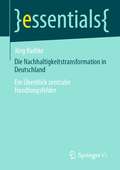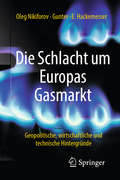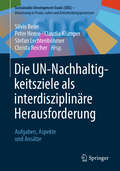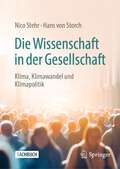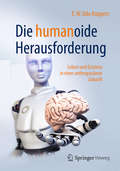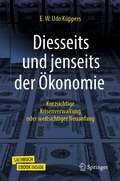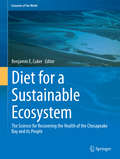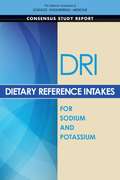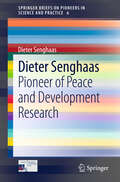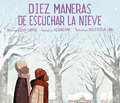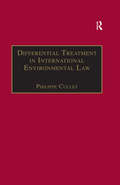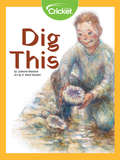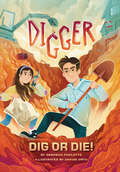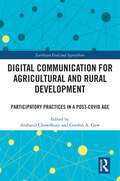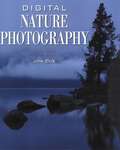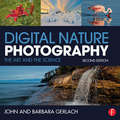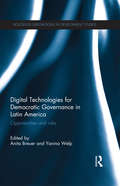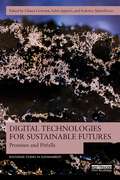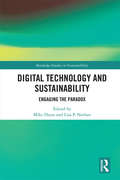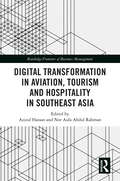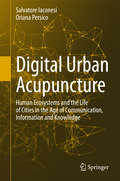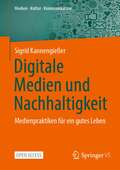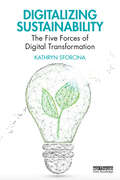- Table View
- List View
Die Nachhaltigkeitstransformation in Deutschland: Ein Überblick zentraler Handlungsfelder (essentials)
by Jörg RadtkeDas essential bietet eine Gesamtschau der deutschen Nachhaltigkeitspolitik. Die Handlungsfelder Agrar, Energie, Verkehr und Wald werden kompakt analysiert und einer Bewertung unterzogen. Im Kern wird die Governance der Nachhaltigkeitstransformation multiperspektivisch in den Handlungsfeldern charakterisiert. Hierbei werden zentrale Herausforderungen herausgearbeitet und Perspektiven für die Zukunft der Klimaschutzpolitik in Deutschland abgeleitet.
Die Rolle Deutschlands im Kontext der Energiewende: Eine ethische Untersuchung normativer Zielkonflikte unter besonderer Berücksichtigung des Braunkohleausstiegs
by Friederike HenkeWie lassen sich notwendige Klimaschutzmaßnahmen wie der Braunkohleausstieg so umsetzen, dass sowohl auf lokaler aber auch auf gesamtgesellschaftlicher Ebene keine moralischen Rechtsverletzungen entstehen? Um diese Frage zu beantworten, ist es zunächst notwendig, drohende normative Zielkonflikte genau zu analysieren. Dieser Aufgabe widmet sich die vorliegende Arbeit. Anhand des Beispiels des Braunkohleausstiegs im Rheinischen Revier werden Zielkonflikte in Bezug auf das energiepolitische Zieldreieck, auf entstehende soziale Härten und auf Konsequenzen wie ein Erstarken rechtspopulistischer Parteien untersucht. Auf Basis dessen werden mögliche Lösungsansätze skizziert.
Die Schlacht um Europas Gasmarkt: Geopolitische, wirtschaftliche und technische Hintergründe
by Oleg Nikiforov Gunter-E. HackemesserEuropa wird zum Spielplatz verschiedener Weltkräfte, die um die Gaslieferungen nach Europa kämpfen. In erster Linie sind die wirtschaftlichen Aspekte dieser Bestrebungen analysiert. Eine wichtige Rolle spielen der Bedarf mit der Berücksichtigung der vorhandenen europäischen Energieprogramme sowie Umwelt- und Klimabeschlüsse, die allgemein verständlich dargelegt sind. Außerdem sind die Regel- und Gasvorräte der Gas anbietenden Lieferanten erklärt. Vor diesem Hintergrund werden auch politische Auseinandersetzungen ausgewertet.
Die UN-Nachhaltigkeitsziele als interdisziplinäre Herausforderung: Aufgaben, Aspekte und Ansätze (Sustainable Development Goals (SDG) – Umsetzung in Praxis, Lehre und Entscheidungsprozessen)
by Christa Reicher Silvio Beier Peter Hense Claudia Klümper Stefan LechtenböhmerDieses Buch gibt Einblicke in die Zielsetzungen und zu den Herausforderungen der Nachaltigkeistzielde der UN. Ausgehend von den Blickwinkeln einzelner Fachdisziplinen wird allgemein verständlich die Zelsetzung mit einem Blick auf europäische Verhältnisse erläutert und mit den Anforderungen an andere Fachdisziplinen verknüpft, die notwendig sind, damit ein Erreichen realistisch und zielführend vorangetrieben werden kann.
Die Wissenschaft in der Gesellschaft: Klima, Klimawandel und Klimapolitik
by Nico Stehr Hans von StorchAls die Autoren – über die Grenzen zweier Wissenschaftskulturen hinweg – Anfang der 90er Jahre begannen, über die wissenschaftliche und populäre Wahrnehmung und Konstruktion des Phänomens Klima, Klimawandel, Klimapolitik und die Auswirkungen des Klimas auf die Gesellschaft nachzudenken, stießen sie auf erheblichen Widerstand, insbesondere als sie über die dringende Notwendigkeit einer gesellschaftlichen Anpassung an den Klimawandel schrieben. Die Autoren sehen sich als Pioniere in diesem Politikfeld. Viele, wenn nicht die meisten Maßnahmen für den Klimaschutz und gegen die Klimafolgen erfordern die Innovationskraft aller Wissenschaften und der Technik. Die künftige Umsetzung wissenschaftlicher Erkenntnisse in der Klimapolitik ist Schlüssel des erfolgreichen Umgangs der Gesellschaft mit den Folgen des Klimawandels. Dies geschieht jedoch nicht automatisch. Die Umsetzung von Wissenschaft in die Gesellschaft unterliegt ökonomischen, politischen und kulturellen Zwängen, und kann insbesondere durch den Mehrwert interdisziplinärer Zusammenarbeit von Wissenschaftlern, wie sie in diesem Band praktiziert wird, erreicht werden.
Die humanoide Herausforderung: Leben und Existenz in einer anthropozänen Zukunft
by E.W. Udo KüppersCui bono? – Wem nutzt die Entwicklung humanoider Maschinen oder Automaten? Dieses Buch erörtert die Details dieses Spannungsfelds und die Herausforderung gesellschaftlicher Weiterentwicklung. Als technisch-elektronische Handhabungsgeräte können sie den Menschen zuträglich sein, sie von körperlich belastenden Arbeiten oder sogenannten Routinearbeiten befreien. Der Autor versucht die Fragen zu beleuchten: Was erwartet die Menschheit durch die Entwicklung einer künstlichen Intelligenz in einer menschähnlichen Maschine? Was aber, wenn der selbstbestimmende Mensch an der Schwelle steht, sich selbst durch intelligente selbstorganisierte Produkte und Prozesse eine humanoide Konkurrenz zu schaffen, die er möglicherweise nicht mehr kontrollieren kann?
Die unsichtbaren Folgen des Extraktivismus: Ein Blick hinter die slow violence der chilenischen Bergbauindustrie (Energiepolitik und Klimaschutz. Energy Policy and Climate Protection)
by Anna LandherrDieses Open-Access-Buch beschäftigt sich mit Umweltproblemen, die selbst im Kontext der heutigen globalen ökologischen Krise weitgehend gesellschaftlich unsichtbar bleiben, da sie ihre oftmals schwerwiegenden sozial-ökologischen Auswirkungen allmählich, schleichend und über längere Zeiträume hinweg in Form einer slow violence (Rob Nixon) entfalten. Am Beispiel der toxischen Industrieabfälle (Tailings) der chilenischen Bergbauindustrie werden in der Untersuchung anhand von drei Fallstudien die zentralen Gründe und Dimensionen dieser Unsichtbarkeit dargestellt und ihr Zusammenspiel analysiert.
Diesseits und jenseits der Ökonomie: Kurzsichtige Krisenverwaltung oder weitsichtiger Neuanfang
by E. W. KüppersWeltwirtschaftskrisen sind immer auch Gesellschaftskrisen! Treibende ökonomische Kräfte verfolgen als »homo oeconomicus« rücksichtslos isoliert exzessive Wachstumsziele mit einem skurrilen Tanz ums »goldene BIP-Kalb« – auf Kosten aller anderen Gesellschaftsinteressen und unter Inkaufnahme massiver Umweltzerstörungen. Das Paradoxe dabei ist, dass sich die Ökonomie amüsanterweise als naturwissenschaftlich geprägt sieht, obwohl sie zutiefst den Sozialwissenschaften zuzurechnen ist. Der scheinbar unaufhaltsame Trend einer diesseitigen Ökonomie erfordert angesichts sich häufender sozialer und ökologischer Probleme einen einschneidenden Richtungswechsel. Dieser kann nur darin bestehen, dass eine jenseitige Ökonomie die Interessen aller Gesellschaftsteinehmer, im engen Verbund mit dem Erhalt unserer natürlichen Lebensgrundlage stärkt und fördert. Während eine diesseitige (mono)kausale Ökonomie konfliktträchtige Ziele verfolgt, ist eine jenseitige Ökonomie geprägt durch eine vorausschauende systemische Perspektive nachhaltiger gesellschaftlicher Weiterentwicklung.
Diet for a Sustainable Ecosystem: The Science for Recovering the Health of the Chesapeake Bay and its People (Estuaries of the World)
by Benjamin E. CukerThis book explores a specific ecosystem in depth, in order to weave a story built on place and history. It incorporates the theme of a journey to help reveal the environment-human-health-food system-problem. While drawing on a historical approach stretching back to the American colonial era, it also incorporates more contemporary scientific findings. By crafting its story around a specific place, the book makes it easier for readers to relate to the content, and to subsequently use what they learn to better understand the role of food systems at the global scale.
Dietary Reference Intakes for Sodium and Potassium (Dietary Reference Intakes Ser.)
by Engineering Medicine National Academies of SciencesAs essential nutrients, sodium and potassium contribute to the fundamentals of physiology and pathology of human health and disease. In clinical settings, these are two important blood electrolytes, are frequently measured and influence care decisions. Yet, blood electrolyte concentrations are usually not influenced by dietary intake, as kidney and hormone systems carefully regulate blood values. Over the years, increasing evidence suggests that sodium and potassium intake patterns of children and adults influence long-term population health mostly through complex relationships among dietary intake, blood pressure and cardiovascular health. The public health importance of understanding these relationships, based upon the best available evidence and establishing recommendations to support the development of population clinical practice guidelines and medical care of patients is clear. This report reviews evidence on the relationship between sodium and potassium intakes and indicators of adequacy, toxicity, and chronic disease. It updates the Dietary Reference Intakes (DRIs) using an expanded DRI model that includes consideration of chronic disease endpoints, and outlines research gaps to address the uncertainties identified in the process of deriving the reference values and evaluating public health implications.
Dieter Senghaas
by Dieter SenghaasDieter Senghaas, professor emeritus of international relations, University of Bremen, was one of most innovative contemporary German social scientists, with major contributions on peace and development research and on music and peace. He was awarded many prizes: the International Peace Research Award (1987), Göttingen Peace Prize (1999), Culture and Peace Prize of the Villa Ichon in Bremen (2006), and the Leopold-Kohr Prize of the Austrian Ministry of Science and Research (2010). In addition to his autobiographic notes and his selected bibliography, this book offers a global audience five key texts by D. Senghaas (1974-2009): Towards an Analysis of Threat Policy in International Relations; Friedrich List and the Basic Problems of Development; Developing the Definitions of Perpetual Peace ('para pacem'): Through What and How is Peace Constituted Today?; Sounds of Peace: On Peace Fantasies and Peace Offerings in Classical Music; and Enhancing Human Rights - A Contribution to Viable Peace.
Diez maneras de escuchar la nieve
by Cathy CamperUn día nevado, una visita a la abuela, tiempo cocinando juntas y un espacio para pausar y descubrir el mundo a tu alrededor se reúnen en este libro perfecto para leerse y compartirse en un acogedor día de invierno. Una mañana de invierno, Lina despierta al silencio. Es el sonido de la nieve —el tipo que se ve suave y brilla luminosa con el sol del invierno. Pero mientras Lina camina hacia la casa de su abuela para ayudarla a cocinar la receta familiar de warak enab, ella sigue escuchando. Mientras Lina pasa hombres de nieve y cruza aceras congeladas, descubre diez maneras de poner atención a lo que de otra forma habría pasado desapercibido. Con ilustraciones maravillosas por Kenard Pak y la considerada representación de la vida de una familia árabenortemericana moderna por Cathy Camper, Diez maneras de escuchar la nieve es una exploración escalonada sobre contemplación, empatía, y sobre lo que descubrimos cuando el mundo guarda silencio.
Differential Treatment in International Environmental Law
by Philippe CulletThis book is a comprehensive study of differential treatment for developing countries in international environmental law. It offers a compelling analysis of the legal dimension of the relationship between developed and developing countries in the environmental field and beyond. It first critically examines the principle of legal equality of states and then explores the conceptual framework behind the notion of differential treatment in international law and its relevance in bringing about substantive equality. The book examines the development of differentiation in international environmental law, considers its application in various environmental treaties and evaluates the legal status of existing differential norms. It also examines the contribution of differentiation to the implementation of environmental treaties and the extent to which differential treatment fosters the decentralization of international environmental policy making. It is an indispensable resource for all actors involved in environmental law and policy making, scholars and students.
Dig This
by Julienne MarlaireWhen Austin finds out that he and his sister Payton will have to spend the day with their rock hound Uncle Ted looking for geodes, he is not interested. That is until Austin finds a geode of his own! Do you know how geodes are made?
Digger: Dig or Die!
by Deborah CholetteIn this dystopian middle-grade novel, a climate change disaster forces humanity to flee as Earth's atmosphere escapes into space. Narrated by siblings Nick and Lily, the story follows their resourcefulness in aiding neighbors. Nick's digging prowess and Lily's strategic planning become vital as oxygen diminishes. Nick unveils a hidden tunnel connecting houses, forming a lifesaving network as breathable air dwindles. Lily crafts a communication system with walkie-talkies and baby monitors to share critical information. A frantic race ensues to complete the tunnels before food and oxygen become scarce, a tense battle for survival in a world teetering on the brink.
Digital Communication for Agricultural and Rural Development: Participatory Practices in a Post-COVID Age (Earthscan Food and Agriculture)
by Gordon A. GowThis volume presents insights on the challenges of digital communication and participation in agricultural and rural development. The COVID-19 pandemic has revealed that digital technology and mediated participation is more important and essential in managing ongoing communication for development projects than ever before. However, it has also underscored the various challenges and gaps in knowledge with digital participatory practices, including the further exclusion of marginalized groups and those with limited access to digital technology. The book considers how the concept of participation has been transformed by the realities of the pandemic, reflecting on essential principles and practical considerations of communication for development and social change, particularly in the context of global agriculture and food security, the well-being of rural communities, and evolving environmental challenges, such as climate change. In gathering these insights, this volume highlights lessons for the future of participatory development in communication for development and social change processes. This volume will be of great interest to students and scholars of agricultural and rural development, communication for development, digital communication, and sustainable development more broadly.
Digital Nature Photography
by Jon CoxDigital Nature Photography is the definitive how-to book on photographing nature with a digital camera. Focusing primarily on the art of taking the picture in the field--rather than just manipulating the image after it has been shot--this comprehensive guide is geared to the nature photographer who is fairly new to the world of digital cameras. Packed with step-by-step directions and resplendent full-color examples from the author's own body of work, readers will receive hands-on practice with lighting, composition, landscapes, sunrises, sunsets, animal portraits, close-ups, manipulating and storing images, and much more. The essential reference for every level of photographer, Digital Nature Photography guides the reader through a magnificent and unique visual experience into the natural world.
Digital Nature Photography: The Art and the Science
by John and GerlachIdentifying a beautiful image in nature is easy, but capturing it is often challenging. To truly seize the essence of a photograph shot out of the studio and in the world requires an artistic eye and impeccable set of photographic techniques. John and Barbara Gerlach have been teaching photographers how to master the craft of photographing nature and the outdoors through their workshops and best-selling books for more than twenty years. Now, equipped with brand new images to share and skills to teach, this celebrated photo team is sharing their latest lessons in the second edition of Digital Nature Photography. Notable revisions in this new edition include introducing the concepts of focus stacking and HDR, as well as expanded discussions of multiple exposure, wireless flash, RGB histograms, live view, shutter priority with auto ISO, hand-held shooting techniques, and the author’s equipment selections. The inspiring imagery in this book covers a broader range of subjects than before including ghost towns, the night sky, animals, and sports, in addition to the classic nature photographs we expect from this very talented author team. This book is a comprehensive guide to one of the broadest subjects in photography, explained and dymystified by two respected masters.
Digital Technologies for Democratic Governance in Latin America: Opportunities and Risks (Routledge Explorations in Development Studies)
by Yanina Welp Anita BreuerThis book is the first to comprehensively analyse the political and societal impacts of new Information and Communication Technologies (ICT) in a region of the Global South. It evaluates under what conditions some Latin American governments and people have succeeded in taking up the opportunities related to the spread of ICTs, while others are confronted with the pessimist scenario of increased, digitally induced social and democratic cleavages. Specifically, the book examines if and how far the spread and use of new ICT affected central aims of democratic governance such as reducing socio-economic and gender inequality; strengthening citizen participation in political decision making; increasing the transparency of legislative processes; improving administrative processes; providing free access to government data and information; and expanding independent spaces of citizen communication. The country case and cross-country explore a range of bottom-up driven initiatives to reinforce democracy in the region. The book offers researchers and students an interdisciplinary approach to these issues by linking it to established theories of media and politics, political communication, political participation, and governance. Giving voice to researchers native to the region and with direct experience of the region, it uniquely brings together contributions from political scientists, researchers in communication studies and area studies specialists who have a solid record in political activism and international development co-operation.
Digital Technologies for Sustainable Futures: Promises and Pitfalls (Routledge Studies in Sustainability)
by Chiara Certomà Fabio Iapaolo Federico MartellozzoThis book critically examines the interplay between digitalization and sustainability. Amid escalating environmental crises, some of which are now irreversible, there is a noticeable commitment within both international and domestic policy agendas to employ digital technologies in pursuit of sustainability goals.This collection gathers a multitude of voices interrogating the premise that increased digitalization automatically contributes to greater sustainability. By exploring the planetary links underpinning the global digital economy, the book exposes the extractive logics ingrained within digital capitalism and introduces alternatives like digital degrowth and the circular economy as viable, sustainable paths for the digital era. Through a combination of theoretical reflections and detailed contextual analyses from Italy, New Zealand, and the UK—including initiatives in participatory planning and technology co-design—it articulates the dual role of digital technology: its potential to support socio-economic and environmental sustainability, while also generating conflicts and impasses that undermine these very objectives. Offering fresh insights into power disparities, exclusionary tactics, and systemic injustices that digital solutionism fails to address, this volume also serves as a reminder that sustainability extends beyond climate-related issues, underscoring the inseparability of environmental discourse from wider social justice considerations.Aimed at a diverse readership, this volume will prove valuable for students, researchers, and practitioners across various fields, including Geography, Urban Studies, Sustainability Studies, Environmental Media Studies, Critical AI Studies, Innovation Studies, and the Digital Humanities.
Digital Technology and Sustainability: Engaging the Paradox (Routledge Studies in Sustainability)
by Mike Hazas Lisa NathanThis book brings together diverse voices from across the field of sustainable human computer interaction (SHCI) to discuss what it means for digital technology to support sustainability and how humans and technology can work together optimally for a more sustainable future. Contemporary digital technologies are hailed by tech companies, governments and academics as leading-edge solutions to the challenges of environmental sustainability; smarter homes, more persuasive technologies, and a robust Internet of Things hold the promise for creating a greener world. Yet, deployments of interactive technologies for such purposes often lead to a paradox: they algorithmically "optimize" heating and lighting of houses without regard to the dynamics of daily life in the home; they can collect and display data that allow us to reflect on energy and emissions, yet the same information can cause us to raise our expectations for comfort and convenience; they might allow us to share best practice for sustainable living through social networking and online communities, yet these same systems further our participation in consumerism and contribute to an ever-greater volume of electronic waste.By acknowledging these paradoxes, this book represents a significant critical inquiry into digital technology’s longer-term impact on ideals of sustainability. Written by an interdisciplinary team of contributors this book will be of great interest to students and scholars of human computer interaction and environmental studies.
Digital Transformation in Aviation, Tourism and Hospitality in Southeast Asia (Routledge Frontiers of Business Management)
by Azizul Hassan and Nor Aida Abdul RahmanTechnological advances and the drive to digitalize business processes in aviation, tourism, and hospitality have forced the industries to go along with the digital movement. The results are often mixed. This book brings together contributions from leading scholars in the field and explores the digital transformation in these industries in Southeast Asia. The book looks at the impact of digital transformation on the region and the issues and challenges brought about by this transformation. It also addresses trends in the industries from blockchain technology, AI, biometric and mobile technology applications to in-flight catering. It examines the impact of COVID-19 on the industries and how the pandemic has led to businesses adopting new business models. Through the case studies of digital adoptions in the region, readers will gain insights on how the countries have leveraged new technologies and the implementation processes to drive digital transformation. The book aims to help scholars and policy makers understand the digital advances in the industries to better formulate responses in research and policy making and deliver effective digital transformation.
Digital Urban Acupuncture
by Salvatore Iaconesi Oriana PersicoThis book explores the possibility to observe the lives of cities through ubiquitous information obtained through social networks, sensors and other sources of data and information, and the ways in which this possibility describes a new form of Public Space, which can be used to define new forms of citizenship and participated city governance. The work is the result of years of research across sciences, arts, design, ethnography, cultural geography, performed by multiple researchers, understanding the Relational Ecosystems of cities (the flows of relation, information, knowledge and emotion in the city) and using them to reinterpret the concept of Urban Acupuncture: from the Third Space, Third Landscape and Third Generation City, to the Third Infoscape; from Urban Acupuncture to Digital Urban Acupuncture. The book starts by exploring the many theories and methodologies which have been used to try to capture and use the revolutionary potential found in the daily lives of cities. From De Certeau, to Latour, Bateson, Bhabha, and all the way to Castells, Clèment, Boyd, Casagrande. In a progression which moves from the Third Space (Soja, De Certeau), to the Third Landscape (Clèment), to the Third Generation City (Casagrande), to the Third Paradise (Pistoletto), the book arrives at a definition of the Third Infoscape, following up on Kevin Lynch: a new legibility and imageability of the city. Its main themes and objectives lie in the desire to observe and understand the radical transformation of the definitions, boundaries and configurations of what we call public and private spaces, in different cultures and communities, in the age of communication, information and knowledge, and to use these understandings to formulate a set of working hypotheses for the positive, constructive, active and participatory usage of these transformed scenarios, contributing to the re-definition of concepts such as citizenship, city-governance, urban planning, civic decision-making, and more. And using, in the process, techniques such as Urban Acupuncture, Actor-Network Theory, Diasporic analysis, Peer-to-peer Urbanism and more. Multiple real-life research scenarios and documented case studies will be used, from 4 continents, coming from our research and from other international contributions.
Digitale Medien und Nachhaltigkeit: Medienpraktiken für ein gutes Leben (Medien • Kultur • Kommunikation)
by Sigrid KannengießerWie nutzen Individuen, Nichtregierungsorganisationen und Unternehmen digitale Medien, um zu einer nachhaltigen Gesellschaft beizutragen? Die Autorin rekonstruiert in dieser Open-Access-Publikation die sozial-ökologischen Folgen aktueller Digitalisierungsprozesse und zeigt anhand dreier Fallstudien, wie verschiedene Akteur*innen Digitalisierung nachhaltiger gestalten (wollen): Neben dem Reparieren von Medientechnologien in Repair Cafés wurde die Produktion und Aneignung fairer Medientechnologien am Beispiel des Fairphones untersucht sowie Onlineplattformen, die für nachhaltigen Konsum werben, am Beispiel von utopia.de. Sind dies Beispiele für Medienpraktiken, die das Ziel der Nachhaltigkeit verfolgen, so werden in der vergleichenden Analyse auch Grenzen und Ambivalenzen dieses Handelns offenbar.
Digitalizing Sustainability: The Five Forces of Digital Transformation
by Kathryn SforcinaDigitalizing Sustainability outlines why ‘business as usual’ isn't working and sets out five Transformational Forces which can be used to innovate and scale sustainability solutions using digital means. This transformation will be powered by a range of digital technologies that have the potential to ideate, propel and scale sustainability solutions in an exponential manner over the next decade. This book introduces the Five Forces of Digital Transformation. These forces all share a common root – they are powered by digital technologies that enable them to operate at the speed and scale that we need to achieve global transformation for people and planet. Working together, these forces help overcome many of the barriers and pitfalls that humanity has faced in trying to achieve sustainability 2.0 and will help you tackle these questions: Why has sustainability 1.0 failed us? What are the bugs and bad code in our operating systems that we must address to have any hope of creating a sustainable civilization? What are the Five Forces of Digital Transformation that will forge a sustainable and resilient future for our people and planet? What are the core priorities going forward for coalitions of the willing to harness these forces for sustainability and resilience? Disruptive and innovative, this book provides readers with a clear path forward to a sustainable digital future. It will be of great interest to anyone interested in the adoption of digital technologies for driving solutions to global sustainability challenges.
